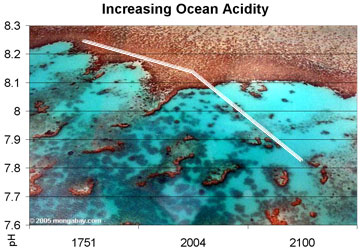Groups call for doubling of reef protection for International Year of the Reef
Groups call for doubling of reef protection for International Year of the Reef
mongabay.com
January 25, 2008
|
|
Thursday 17 countries and 30 organization launched the International Year of the Reef, a campaign to protect coral reefs increasingly threatened by climate change, pollution, and unsustainable activities.
In recognition of the initiative, three conservation groups — WWF, The Nature Conservancy and Conservation International — have called upon world governments to expand the area of coral reefs under protection globally from the current level of 15 percent to 30 percent. The groups say that marine protected areas will need to be “designed as systems that are able to resist or recover rapidly from the multiple stresses they face, including those caused by climate change.”
“Coral reefs face some of the world’s most pressing environmental challenges — from climate change to destructive fishing practices. Reefs host a variety of vital sea life and are key to the health of the world’s oceans,” said Bill Eichbaum, vice-president and managing director at WWF. “As we mark 2008 as the International Year of the Reef, we are calling on all stakeholders to step up the pace of action to protect reefs around the world.”
 Observed and projected decline in global ocean pH, 1750-2100. Photo by Rhett A. Butler |
“The continued existence of much of the world’s coral reefs is in doubt unless the world’s governments and private sector take immediate and concerted action to stem the loss. These ecosystems are vital to the economies of many countries and the well-being of millions of people,” said Roger McManus, vice president for Conservation International’s Marine Programs. “Many reef systems in jeopardy today can be saved and recovered if we all work together to adapt for climate change and to prevent other human-caused stress. We are working in the Coral Triangle and on coral reefs around the world to ensure a future for these unique ecosystems.”
“Coral reef conservation for many developing countries is about more than aesthetics. For the more than one billion people living in coastal communities across the tropics, healthy reefs mean food and a way to earn a living,” said Lynne Hale, director of the Global Marine Team of The Nature Conservancy.
Scientists say the outlook for coral reefs — often termed the rainforests of the sea — is dire. Overfishing, pollution, damage from anchors, mining for construction materials, and over-collection for the pet trade are all over-shadowed by climate change which could decimate reefs by higher water temperatures and increasingly acidic conditions which could render many coral species incapable of forming carbonate support structures. However research from the World Conservation Union (IUCN) and The Nature Conservancy suggests that measures can be taken to help increase the survival chances for coral reefs.